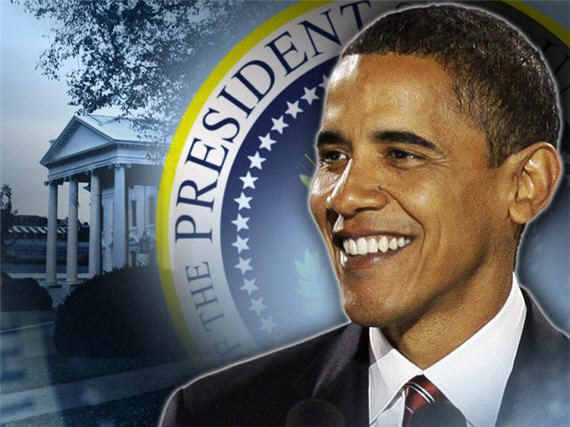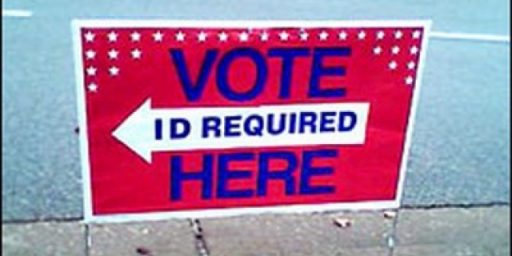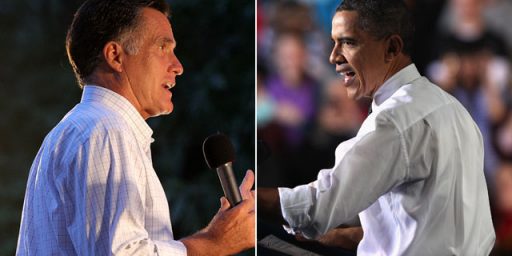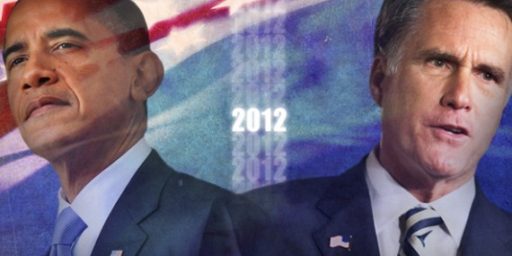Obama’s Path To Victory
Despite the seeming odds against him, the Electoral College map is very favorable for President Obama.
There’s no question that President Obama faces a tough road in 2012. His approval ratings remain below 50%, on the economy his job approval is even worse off, the American public is clearly not pleased with the direction of the country, and he’s under 50% in head-to-head matchups with all the leading Republican candidates. Moreover, the economic picture over the next twelve months doesn’t look promising at all. GDP growth isn’t expected to be much better than the 2.5% we saw in the 3rd Quarter, job growth remains anemic at best, and the unemployment rate is unlikely to be all that different from where it is right now. In modern, post World War 2, American history no incumbent President has been elected with an unemployment rate higher than 7.0%. Despite all of that, though Chris Cillizza points out that the President still has a path to victory in the Electoral College, which is all that matters:
But with one year to go before the 2012 election, a state-by-state examination of the battleground map suggests that the president still retains several plausible pathways to the 270 electoral votes he needs.
“Although Obama has historically awful numbers, it still requires a herculean effort to defeat him,” said Steven Law, the president of American Crossroads, a conservative group pledging to spend upward of $200 million on the race. “He will have the resources to contest and even give up huge chunks of territory — Florida, Ohio, Virginia and North Carolina — and still win.”
To understand how Obama can maintain that edge — despite opinion polls showing that a majority of Americans think the country is on the wrong track and disapprove of the job he is doing — you need to start with the fact that he won 365 electoral votes in 2008, the largest haul since President Bill Clinton’s 1996 reelection.
Obama won three states — Indiana, North Carolina and Virginia — that no Democrat had carried at the presidential level in at least two decades, and he scored victories in six other states (Colorado, Florida, Iowa, Nevada, New Mexico and Ohio) that George W. Bush had won in 2004. Those nine states will account for 112 electoral votes in 2012 and stand at the center of the fight for the presidency.
If Obama loses every one of them but holds on to the others he won, he will drop to 247 electoral votes and Republicans will win the White House. (The decennial reapportionment of congressional districts after the 2010 Census subtracts six electoral votes from states Obama won in 2008.)
But with the exception of Indiana and its 11 electoral votes, Obama is very much in the game in those states. In several, even Republicans acknowledge that he is favored.
In New Mexico (five electoral votes) and Iowa (six electoral votes), Obama has an edge. New Mexico’s substantial Hispanic population — and Obama’s dominance among that community in 2008 — makes it a tough pickup for Republicans. Iowa is more competitive — Republicans won the governorship there in 2010 — but Obama has long had a connection to the state that his advisers think is lasting and strong.
Assuming Obama can win those two states again — and hold the 19 other states he won that also went to the Democrat, Sen. John F. Kerry (Mass.), in 2004 — he would be just 12 electoral votes shy of 270.
That means Obama could would need to win only one of the following states to be reelected: Florida, North Carolina, Ohio or Virginia. (If he won Virginia and lost Colorado, Florida, Indiana, Nevada, North Carolina and Ohio, his electoral vote total would stand at 271 — the same number Bush won in 2000.)
The other option to this kind of scenario, of course, is a blowout victory by the Republicans or something akin to the victory of Obama had in 2008. This seems to be what many conservatives I talk to seem to be anticipating in 2012, especially the ones who tell me that “anybody” can beat Obama, meaning that it doesn’t really matter if the nominate Mitt Romney, Jon Huntsman, Herman Cain, or Michele Bachmann. That is an attitude that seems to defy reality in many respects. As James Joyner has noted here more than once over the past several months, Barack Obama’s approval numbers, while low, are actually in pretty good shape given the state of the country and the statistics I cited above. More importantly, it’s quite clear that the Republican candidates for President that appeal most to the Tea Party crowd are not the ones most likely to appeal to the independent voters that will decide this election in battleground states. If things improve just a little bit, and the Republicans end up inexplicably nominating a candidate that doesn’t appeal to the voters that control the outcome in states like Virginia and Ohio, then President Obama will have a chance.
Of course, as Cillizza points out, there is one factor that could make things much more difficult for the President. There’s no real indication it’s happening in the polls just yet, but if Barack Obama is unable to hold on to the core group of states that John Kerry won in 2004 and he won in 2008, then it’s incredibly unlikely that he’d be able to win an Electoral College majority. We’re unlikely to see states like California, the Pacific Northwest, or New York in play this time around, and the Northeast all the way down to Maryland, with the exception of New Hampshire, is likely to be safely blue as well. The one vulnerability is in what’s left in the core of America’s manufacturing industry:
The epicenter of that potential Democratic problem is in the Rust Belt, where an aging white population, the continued struggles of the manufacturing economy and large numbers of rural voters could make for a dangerous electoral brew.
Taken together, Michigan, Pennsylvania and Wisconsin will award 46 electoral votes in 2012.
No Republican since George H.W. Bush in 1988 has won Michigan or Pennsylvania, and Ronald Reagan was the last GOP presidential candidate to win in Wisconsin, in 1984.
But there have been close calls in the not-so-distant past.
In 2000, George W. Bush came within 5,500 votes of carrying Wisconsin. In Pennsylvania, he took 49 percent in 2004. And Republicans made gains in the three states in the 2010 election, winning the governorship in each and claiming Senate seats in Pennsylvania and Wisconsin.
In 2010, of course, Republicans made substantial gains in many of these states. Republicans captured the Governor’s office and the State Legislature in Wisconsin, Ohio, Michigan, and Pennsylvania and picked up U.S. Senate seats in Wisconsin and Pennsylvania. Leaving aside the rather obvious fact that voter turnout in 2010 was very different from what it’s likely to be in 2012, those events no doubt serve as warning signals to the Obama campaign. Take Pennsylvania and Wisconsin out of the Democratic table, for example, and give the GOP Ohio, and this race is pretty much over and done with.
This is why I think you’ve seen Democrats spend so much time opposing Republican efforts to scale back public union bargaining rights in states like Ohio and Wisconsin this year. For one thing, it helps to energize the core of their base in that part of the country. For another, it may be the one avenue they have to appeal to independent voters there. The effort in Wisconsin was largely unsuccessful because the law that became the focus of a months-long protest in Madison still stands, and the recall effort against Republican State Senators fell short of dislodging them from majority control in that body. There will apparently be an effort to recall Governor Walker next year, but recent polls seem to indicate that many Wisconsin voters are weary of all the recall elections so it’s unclear how far that will go. We’ll get another test this week in Ohio as a ballot initiative intended to overrule that states Wisconsin-style law is on the ballot in what has turned into a heavily fought election. Based on current poling, it looks quite likely that the Ohio law will go down to defeat, which Democrats will inevitably see as a sign that things are turning their way. Whether that’s true is, of course, another question.
In the end, I remain convinced we’re looking at a close election in 2012. Something more akin to 2004 or 1976 than anything we saw during the Clinton years or in 1988. Things could change, of course. Obama’s poll numbers could collapse in the face of a weak economy, leading to a Republican blowout. Or, the Republicans could decide to nominate their 21st Century version of Barry Goldwater or George McGovern, thus giving the President an unlikely cakewalk to re-election. Neither of these seems likely, though, and as we sit here one year before the day after the 2012 Election, it’s entirely possible that we’ll still be waiting for returns from some obscure district in Ohio, Colorado, Virginia, or North Carolina before we know who our next President will be, and I don’t discount in the least the possibility that his name will be Barack Obama.







The electoral map is the only map that matters, and Obama has been fixated upon it since he unseated the Clintons in 2008. While the GOP clown car trundles in circles, the President is standing before crumbling bridges and naming leadership names, secure in the knowledge he enjoys wide public support for taxing the very wealthy to repair infrastructure. It’s effective.
The GOP problem is which states do they take back from Obama in 2008. If they cannot take FL, the night is over early.
When the rest of the voters tune in, they will be confronted with a video record of GOP obstruction and refusal to accept any responsibility for governing. They will be looking for a plan that contains more than “Obama sucks.” And when we look at actual GOP governing achievements, we find a dry lake bed, calcified with subversive oaths to a single man before the Oath of Office. On that barren plain, old angry men conspire to relieve women of their medical decision-making.
Obama will win handily.
Not as tough as the road Romney/Not Romney will have to take.
this is the GOP motto right now: “our attitude defies reality!”
Obama’s also got John Kasich doing yeoman’s work on his behalf in Ohio, and Governor Scott doing the same in Florida.
If “anyone” can beat Obama…then why aren’t the Jeb Bush’s and the Chris Christie’s and the Bob Riley’s jumping at this once in a lifetime “gimme” opportunity?
A year ago un-employment was at 9.7%. Today it is at 9%. It’s not unreasonable to think that by this time next year it could close to 8%. Not great…but steady improvement. Keep in mind that employment is a lagging indicator…and almost every other economic indicator is moving in the right direction. (real estate and construction…the drivers of a lot of recoveries…still trouble me).
Romney’s answer to speed up the recovery…more tax cuts for himself…er…I mean the rich. On top of that he is signing on to Paul Ryan’s privatization of Medicare, and repealing Omneycare. And then of course there are the flip-flops…the TV ads write themselves. Of course he is also a Mormon…which means absolutely nothing to me…but it means a lot to the xenophobes with tea bags dangling from their tricorns.
No doubt Obama has a struggle on his hands…but he overcame one of the strongest brands in politics in ’08…and with the electoral college lined up in his favor, and a piss-poor opponent…he will win again in ’12.
Hell, Obama’s easiest path to victory is simply to allow the extraordinarily-stupefied GOP primary selectorate to do what they do best: reelect Democrats.
I remember many of the strong predictions about the 2010 elections as well. How did that work out for many of you? Of course I mean your prior to elections predictions and not your after the fact revised predictions.
Doug,
“In 2010, of course, Republicans made substantial gains in many of these states. Republicans captured the Governor’s office and the State Legislature in Wisconsin, Ohio, Michigan, and Pennsylvania and picked up U.S. Senate seats in Wisconsin and Pennsylvania.”
I don’t know state-level politics in most states, but I do know Pennsylvania’s. Pennsylvania’s governorship has flipped parties every 8 years since 1970. It has elected only 2 Democratic Senators since the 1960’s (Harris Wofford’s filling of the remains of John Heinz’s term in 1991, and Bob Casey in 2006). The State Legislature was Republican continuously from 1994 to 2006. The Republican wins in 2010 were not exactly shocking. And many of the other states you mention have had Republican governors recently as well (Tommy Thompson, John Engler, etc.).
A minor quibble perhaps, but the unemployment rate was 7.2% when Reagan was reelected.
I’m not sure the Obama team thinks he has much of a chance to repeat his coastal South victories, hence the Rustbelt strategy. It’ll be interesting to watch how quickly Romney can change his tune on unions once he’s won the nomination.
Obama’s team may see a window to victory right now, but it’s rapidly closing. Obama’s 2008 map has already lost 6 electoral college votes due to redistricting. He’s not going to take Indiana or North Carolina again; that will cost him 26 more ECVs. Florida is unlikely; that’s 29 more. At that point, if the GOP can win PA and OH, it’s all over.
My guess is that he loses much worse than that.
If you think that the 2012 elections will have the same ratio of turnout that the 2010 elections did, you are a tad delusional…
Oh really? Why is that? I’m sure voters in Florida will be seeing a lot of commercials about what Paul Ryan and his ilk want to do with Medicare and Social Security…
Umm, how exactly will the GOP do that…
I remember most Democrats expected a rough time in 2010. Perhaps you could furnish proof to the contrary.
Oh wait, proof? This is Wayne. Sorry.
Rick Scott is at 37% If I was a Republican, I would not be optimistic about FL.
Well, they are working on rigging the election….
@Dan: “It’ll be interesting to watch how quickly Romney can change his tune on unions once he’s won the nomination. ”
It will be interesting, because the GOP hates unions like another major party in the 20th century hated a certain ethnic group.